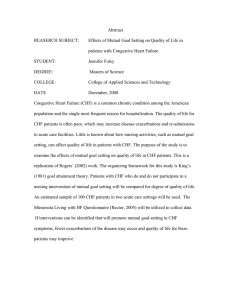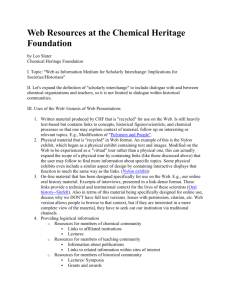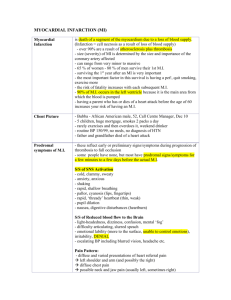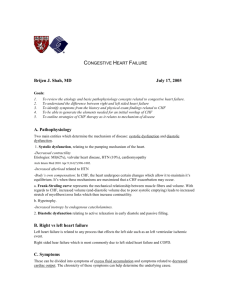Exacerbations of CHF
advertisement
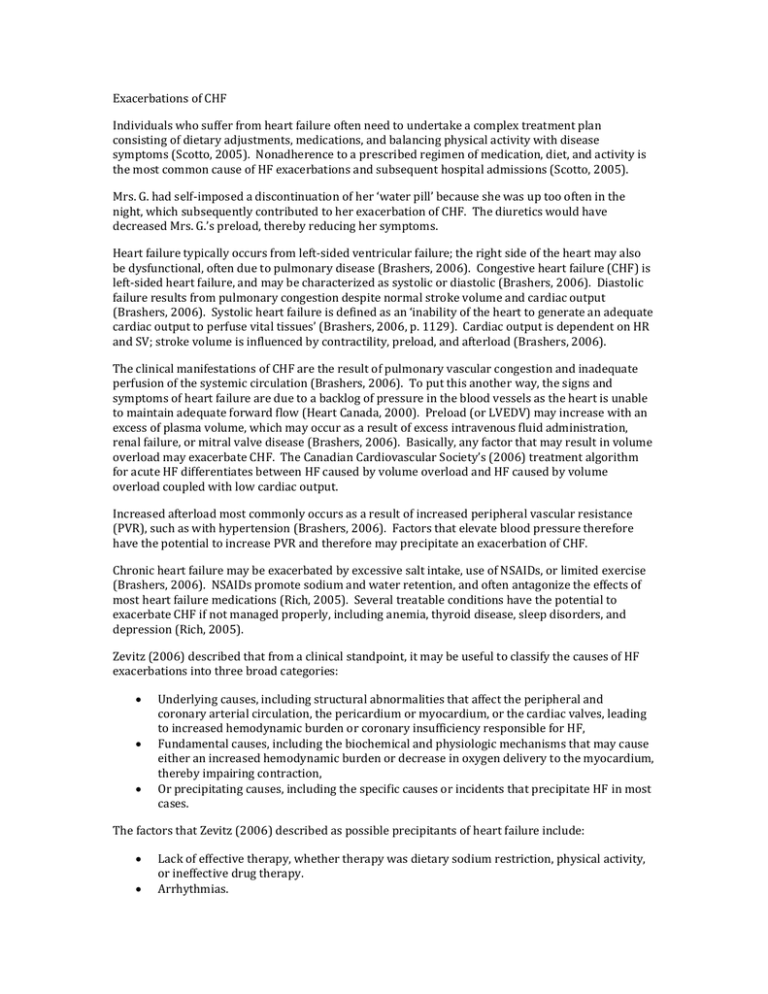
Exacerbations of CHF Individuals who suffer from heart failure often need to undertake a complex treatment plan consisting of dietary adjustments, medications, and balancing physical activity with disease symptoms (Scotto, 2005). Nonadherence to a prescribed regimen of medication, diet, and activity is the most common cause of HF exacerbations and subsequent hospital admissions (Scotto, 2005). Mrs. G. had self-imposed a discontinuation of her ‘water pill’ because she was up too often in the night, which subsequently contributed to her exacerbation of CHF. The diuretics would have decreased Mrs. G.’s preload, thereby reducing her symptoms. Heart failure typically occurs from left-sided ventricular failure; the right side of the heart may also be dysfunctional, often due to pulmonary disease (Brashers, 2006). Congestive heart failure (CHF) is left-sided heart failure, and may be characterized as systolic or diastolic (Brashers, 2006). Diastolic failure results from pulmonary congestion despite normal stroke volume and cardiac output (Brashers, 2006). Systolic heart failure is defined as an ‘inability of the heart to generate an adequate cardiac output to perfuse vital tissues’ (Brashers, 2006, p. 1129). Cardiac output is dependent on HR and SV; stroke volume is influenced by contractility, preload, and afterload (Brashers, 2006). The clinical manifestations of CHF are the result of pulmonary vascular congestion and inadequate perfusion of the systemic circulation (Brashers, 2006). To put this another way, the signs and symptoms of heart failure are due to a backlog of pressure in the blood vessels as the heart is unable to maintain adequate forward flow (Heart Canada, 2000). Preload (or LVEDV) may increase with an excess of plasma volume, which may occur as a result of excess intravenous fluid administration, renal failure, or mitral valve disease (Brashers, 2006). Basically, any factor that may result in volume overload may exacerbate CHF. The Canadian Cardiovascular Society’s (2006) treatment algorithm for acute HF differentiates between HF caused by volume overload and HF caused by volume overload coupled with low cardiac output. Increased afterload most commonly occurs as a result of increased peripheral vascular resistance (PVR), such as with hypertension (Brashers, 2006). Factors that elevate blood pressure therefore have the potential to increase PVR and therefore may precipitate an exacerbation of CHF. Chronic heart failure may be exacerbated by excessive salt intake, use of NSAIDs, or limited exercise (Brashers, 2006). NSAIDs promote sodium and water retention, and often antagonize the effects of most heart failure medications (Rich, 2005). Several treatable conditions have the potential to exacerbate CHF if not managed properly, including anemia, thyroid disease, sleep disorders, and depression (Rich, 2005). Zevitz (2006) described that from a clinical standpoint, it may be useful to classify the causes of HF exacerbations into three broad categories: Underlying causes, including structural abnormalities that affect the peripheral and coronary arterial circulation, the pericardium or myocardium, or the cardiac valves, leading to increased hemodynamic burden or coronary insufficiency responsible for HF, Fundamental causes, including the biochemical and physiologic mechanisms that may cause either an increased hemodynamic burden or decrease in oxygen delivery to the myocardium, thereby impairing contraction, Or precipitating causes, including the specific causes or incidents that precipitate HF in most cases. The factors that Zevitz (2006) described as possible precipitants of heart failure include: Lack of effective therapy, whether therapy was dietary sodium restriction, physical activity, or ineffective drug therapy. Arrhythmias. Systemic infection or development of unrelated illness, including septic shock. Cardiac infection or inflammation, such as in myocarditis or infectious endocarditis. Excessive intake of water and/or sodium. Physical, environmental, and emotional excesses, such as intense prolonged physical exertion or severe fatigue, such as from prolonged travel or emotional crises, or severe climate changes such as traveling to a hot, humid environment. Administration of cardiac depressants or drugs that cause salt retention. High output states such as profound anemia, thyrotoxicosis, myxedema, Paget’s disease of the bone, multiple myeloma, glomerulonephritis, cor pulmonale, polycythemia vera, obesity, cancer, pregnancy, nutritional deficiencies – these all may precipitate HF due to increased myocardial O2 consumption and demand beyond the ability of the O2 supply. Development of a second form of heart disease in an asymptomatic patient may tip the individual in the direction of HF (for example, an individual with chronic hypertension and asymptomatic LV hypertrophy may remain asymptomatic until an MI develops and precipitates HF). When considering factors that may exacerbate CHF, it may also be helpful to consider the risk factors for HF development. While these factors may not directly contribute to the potential for exacerbations of CHF, many of them allude to the pathology behind why an exacerbation may occur. They include: Hypertension. Ischemic heart disease. Diabetes/metabolic syndrome. Hyperlipidemia. Smoking. Obesity. Older age. Male gender. Ethnicity. Physical inactivity. Heavy alcohol consumption. Excessive salt intake. Cardiotoxic agents. Family history/genetics. Low ejection fraction. Impaired diastolic function. Left ventricular hypertrophy. Elevated neurohormonal biomarkers. Abnormal ECG. Increased cardiothoracic ratio. Microalbuminemia. Elevated resting heart rate. (Adapted from Arnold & Howlett, 2007). To provide some concrete numbers along with this information, I will speak to a study that was conducted with 768 patients with CHF and LV dysfunction, exploring factors that acutely precipitated exacerbation of HF. The study provided a nice breakdown of the most common causes of exacerbation of CHF during the time of the study. Over 43 weeks of follow up, 323 episodes of worsening CHF occurred in 180 patients (Tsuyuki, McKelvie, Malcolm, Arnold, Avexum, Barretto, et al., 2001). The factors implicated in the worsening of CHF status included: non-compliance with salt restriction (22%); other non-cardiac causes, notably pulmonary infectious processes (20%); study medications (15%); use of antiarrhythmic agents in the past 48 hours (15%); arrhythmias (13%); calcium channel blockers (13%); and inappropriate reductions in CHF therapy (10%) (Tsuyuki et. al, 2001). While these were the results in only one study, it is useful to see what the causes of the exacerbations were in most cases. The common theme throughout the literature is that proper education is essential for patients and family members regarding CHF and the influencing factors for fluid overload. Information should be given about diet restrictions, including limiting sodium intake to no more than 2000mg/day, with no added salt during meals, and avoidance of high sodium foods (see Table 3); as well as limiting fluid intake to no more than 64 ounces/day (Rich, 2005). (Rich, 2005). Along with the dietary guidelines, patients should be counseled to weigh themselves daily and to maintain their weight within narrow limits depending on the severity of the heart failure. Finally, an exercise program should be developed using symptoms as a guide to gauge exercise intensity and duration (Rich, 2005). Lisa and Nadine References: Arnold, J. M., & Howlett, J. G. (2007). Risk factors for HF development. Canadian Journal of Cardiology, 23(1), 21-45. Brashers, V. L. (2006). Alterations of cardiovascular function. In McCance, K. L., & Huether, S. E. (Eds.), Pathophysiology: The Biologic Basis for Disease in Adults and Children (5th ed., pp. 1081-1146). Elsevier Mosby: St Louis. Canadian Cardiovascular Society. (2006). Treatment algorithm for acute HF. Canadian Journal of Cardiology, 22(3), p. 271. Heart Canada. (2000). Heart failure. Retrieved June 30, 2008, from http://www.heartcanada.com/heartfailure.php Rich, M. W. (2005). Office management of heart failure in the elderly. The American Journal of Medicine, 118, 342-348. Scotto, C. J. (2005). The lived experience of adherence for patients with heart failure. Journal of Cardiopulmonary Rehabilitation, 25, 158-163. Tsuyuki, R. T., McKelvie, R. S., Malcolm, J., Arnold, O., Avezum, A., Barretto, A. C., et. al. (2001). Acute precipitations of congestive heart failure exacerbations. Archives of Internal Medicine, 161, 23372342. Zevitz, M. E. (2006). Heart failure. Retrieved June 30, 2008, from http://www.emedicine.com/MED/topic 3552.htm
